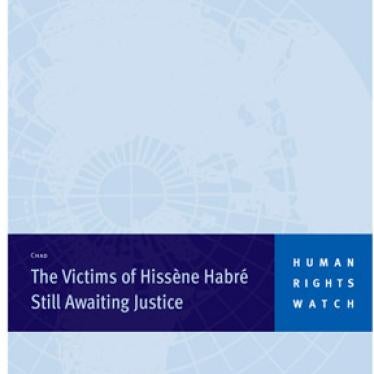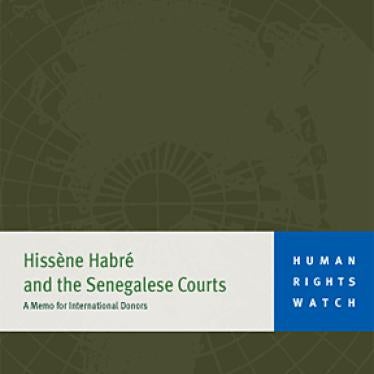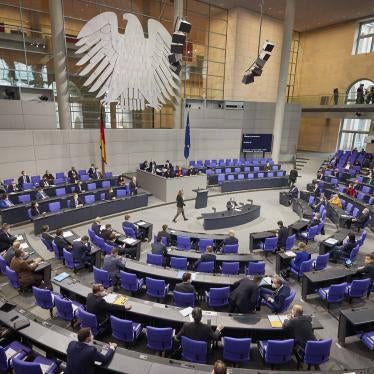(New York)- The Chadian government has declared that it will remove all the accomplices of Chad’s former dictator, Hissène Habré (1982-1990), from government jobs in the central African country. The Chadian government’s announcement was made in a letter from Prime Minister Pascal Yoadimnadji to Human Rights Watch and follows a July report by Human Rights Watch naming 41 leading Habré-era figures, many accused of torture and killings, who still held key posts in Chad
The Chadian government’s announcement was made in a letter from Prime Minister Pascal Yoadimnadji to Human Rights Watch and follows a July report by Human Rights Watch naming 41 leading Habré-era figures, many accused of torture and killings, who still held key posts in Chad.
The prime minister also said that the government would quickly consider a draft law to compensate Habré’s victims and would construct a monument to honor the memory of the victims as soon as it had the funds to do so.
Human Rights Watch welcomed the government’s announcement.
“The government has taken a long step towards breaking with the Habré era by finally getting rid of these men, accused of the worst crimes,” said Reed Brody of Human Rights Watch. “We hope the government also allows their prosecution to go forward and makes good on its promise to provide recognition and compensation to Habré’s victims.”
Habré, who fled Chad on December 1, 1990, was indicted in Senegal in 2000 on charges of torture and crimes against humanity. However, Senegalese courts ruled that he could not be tried in that country, where he remains in exile. Habré now faces similar charges in Belgium, where a judge is pursuing an investigation that may lead to an extradition request.
The prime minister’s letter, dated August 18, said that the “former members of the Documentation and Security Directorate (DDS) will be removed from their positions awaiting their trial. The procedure is underway. Human Rights Watch will be informed when they have all been removed. Some already have.”
Those already dismissed include the powerful director of the Judicial Police who was deputy director of national security under Habré; a surveillance chief who was the director of Habré’s dreaded political police, the DDS; and a man described by a Chadian truth commission as one of Chad’s “most feared torturers.”
The letter added that the “draft law on the reparation of victims and their heirs will be put on the agenda on the National Assembly as soon as possible.” In May, the Chadian victims’ association, the AVCRP, presented a proposal which would provide monetary compensation to victims and their families.
The government's actions in favor of Habré’s victims come as the human rights situation in Chad has taken a worrisome turn. Four journalists have recently been sentenced to prison terms in Chad for publishing information critical of the government.
Background on the Hissène Habré Case
Hissène Habré ruled the former French colony of Chad from 1982 until he was deposed in 1990 by current President Idriss Déby and fled to Senegal. His one-party regime, marked by widespread atrocities, was backed by the United States and France, which saw him as a bulwark against Libya’s Muammar el-Qaddafi. Under President Ronald Reagan, the U.S. gave covert CIA paramilitary support to help Habré take power and remained Habré’s strongest ally throughout his rule, providing his government with massive amounts of military aid. A 1992 official truth commission report accused Habré’s regime of some 40,000 political murders and systematic torture.
Habré was indicted in Senegal in February 2000 on charges of torture and crimes against humanity, but the Senegalese courts ruled that he could not be tried there. Habré’s victims then filed complaints in Belgium under that country’s now-repealed long-arm “universal jurisdiction” law, and Senegal acceded to a U.N. request to hold Habré in Senegal pending an extradition demand. A Belgian judge and police team visited Chad in 2002, where they questioned victims and Habré-era officials, visited former prisons and took custody of the files of Habré’s dreaded political police, unearthed by Human Rights Watch in 2001.
The case was not affected by the repeal of Belgium’s “universal jurisdiction” law because an investigation had already begun and several plaintiffs are Belgian citizens. The Belgian judge is continuing his investigation and it is hoped that he will indict Hissène Habré and seek his extradition.






